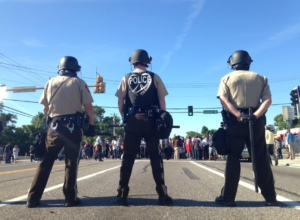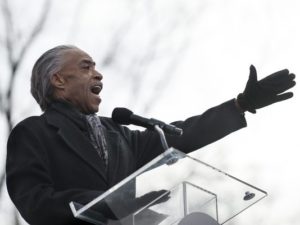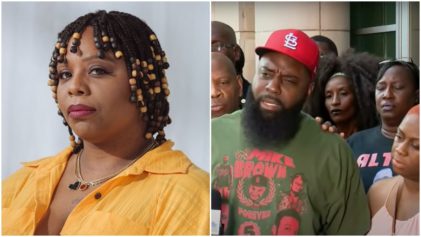
Months have passed since the unarmed 18-year-old was fatally shot at least six times by Ferguson police officer Darren Wilson and despite what has been weeks of protests sweeping across the country, protesters don’t feel like their message is being heard.
It’s a simple message—“Black lives matter.”
Evidence that police officers and other officials across the nation are ignoring that message has come in the form of other officers not being indicted for killing unarmed Black people, a lack of policy changes that would help prevent such incidents from happening again and a mere slap on the wrist for officers spewing racist, hate-filled speech and defiling the names of the many unarmed Black people who were killed by law enforcement.
The most recent example of the latter came when a Ferguson police officer referred to Brown’s memorial as a “pile of trash.”
His punishment was unpaid leave and the police department is remaining tight-lipped about any other disciplinary actions against the officer.
Around 4 a.m. on Friday, Ferguson residents discovered that Brown’s memorial had been run over by a car and many claim it was done on purpose.
“Someone destroyed the #MikeBrown memorial on Canfield,” one user tweeted. “Hasn’t that family, that community suffered enough.”
Little did the community know that the Ferguson Police Department was about to add insult to injury.
Not only did the department say the destruction of the memorial was not being considered a crime “at this point,” but one Ferguson officer called the memorial a “pile of trash” and criticized the Washington Post for even being concerned about it.
“I don’t know that a crime has occurred,” Ferguson Police Department spokesman, Officer Timothy Zoll, told the Washington Post. “But a pile of trash in the middle of the street? The Washington Post is making a call over this?”
The officer initially claimed he had been misquoted but eventually fessed up to the offensive and disrespectful comments.

Based on the past response to racist officers and police brutality in the city, people aren’t too hopeful that those “disciplinary actions” will be anything substantial.
Meanwhile, the city is trying to distance itself from the offensive comments and insists that Zoll’s comments are not a direct reflection of the city’s views.
“The City of Ferguson wants to emphasize that negative remarks about the Michael Brown memorial do not reflect the feelings of the Ferguson Police Department and are in direct contradiction to the efforts of City officials to relocate the memorial to a more secure location,” the statement said.
The community came together to restore the memorial but social media users made it clear that they have received the Ferguson police department’s message loud and clear.
“For the spokesperson of the Ferguson PD to just call the Mike Brown memorial a ‘pile of trash’ is just downright infuriating,” one user tweeted.
Another tweet about the incident pointed out that, “the racism of the #Ferguson PD remains intense, 141 days since the death of Mike Brown. Nothing has changed. Officers STILL lie.”
It’s that kind of message that is creating a bit of a rift between civil rights leaders and new age activists.
Activists have grown weary of repeating chants, marching through city streets and launching campaigns for policy changes only to see extremely slow progress, if any at all.
These frustrations are causing many young activists who were at the forefront of organizing movements following Brown’s death to butt heads with older civil rights leaders like Rev. Al Sharpton.
These younger protesters are demanding a more prominent voice in the push for justice and want to take a much edgier approach than continuing marches and die-ins.
Needless to say, it has been longstanding civil rights leaders who have remained in the media spotlight while younger organizers seem hidden in the shadows.
Earlier this month 25-year-old activist Johnetta Elzie took an unusual approach to have her message heard.
“This movement was started by the young people,” Elzie said after she, along with other protesters, pushed her way to the front of the stage during a march organized by Sharpton. “We started this. There should be young people all over this stage. This should be young people all up here.”
It isn’t the first time something like this happened.
Back in October rapper and activist Tef Poe made his way to the stage to tell a crowd of demonstrators that NAACP President Cornell William Brooks was out of touch.
“This ain’t your grandparents’ civil rights movement,” Poe said. “A lot of us are not scholars. We’re not trained organizers. We are not professional activists. We are just real people who identified a problem and decided to do something about it.”
Despite the tensions between long-standing activists and those of a more new age radical movement, both groups are pushing for the same end result.

Members of both groups of activists have also made it clear that they are willing to face time behind bars if it means making a difference and contributing to the greater cause.
The latest example has been 19-year-old Joshua Williams.
The St. Louis teen was charged with arson, second-degree burglary and stealing less than $500 on Saturday.
The allegations come as a surprise for many in the community who recognized Williams as an advocate for peaceful demonstrations.
Williams was arrested multiple times in the past for unlawful assembly and refusal to disperse as he protested in Ferguson, but the latest charges are much more serious.
Williams was being held on a $30,000 bond after officers accused him of using lighter fluid to set multiple fires inside and outside a QuikTrip in Berkeley.
According to court records, Williams already confessed to the allegations and officials say nearby surveillance footage captured the teen in the act.
The arson and theft allegations against Williams came after 18-year-old Antonio Martin was fatally shot by a white police officer in Berkeley.
Police claim surveillance footage revealed that Martin pulled a gun on the unidentified 34-year-old officer before the officer fired.


